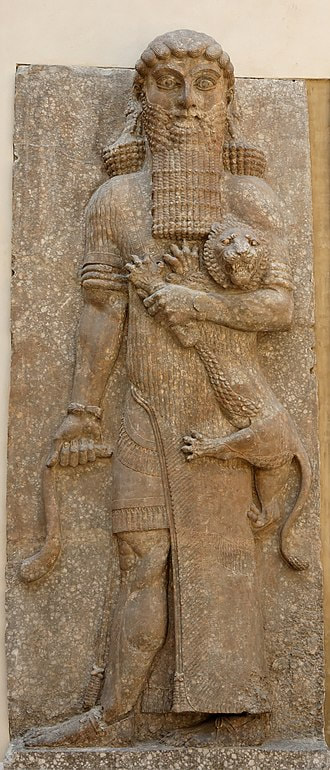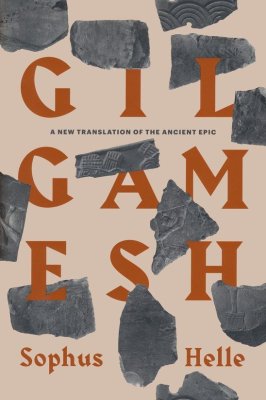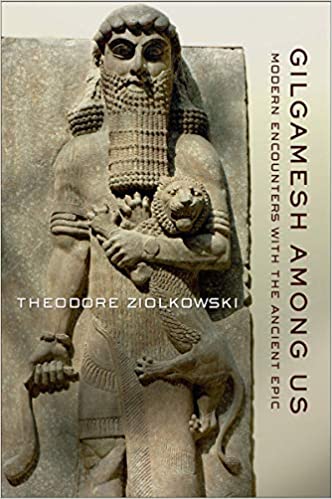He Who Saw the Deep
Gilgamesh in Process
The Epic of Gilgamesh is about many things: "love between men, loss and grief, the confrontation with death; the destruction of nature; insomnia and restlessness, finding peace in one’s community, the voice of women, the folly of gods, heroes, and monsters—and more...It continues to speak to us in many ways." Thus writes Sophus Helle in the introduction to his translation of Gilgamesh. Click here.
The purpose of this page is to offer resources to the Open Horizons community for "opening our horizons" to the Mesopotamian world and the Epic of Gilgamesh. In the epic we meet a self-centered hero who becomes, in his way, a philosopher by the end of the epic. He realizes that he can find peace of mind only by abandoning his existential self-absorption, which includes a quest for personal immortality, and identifying with a wider family. In his context that wider family is the city to which he belongs and its people. In our context it is our local community and family, and perhaps also our city and nation; but it is also the web of life on Earth. The idea of identifying with the web of life is also part of Gilgamesh's journey. At one stage he destroys a forest teeming with life and is punished by the gods. We, too, are destroying our forests.
Still, there is the personal side of Gilgamesh's life, and part of the pleasure of the epic is to identify with it. He knows what it is like to love another man, perhaps sexually, and to have that friend die. We, too, know this experience of loss, whether homosexual or heterosexual. We, too, wonder about the mystery of death.
And, as is expected, Gilgamesh fights monsters, as do we all. They can be outside us or inside us: part of our madness of other and part of our own madness. In short, the Epic of Gilgamesh is among us. In Whiteheadian language, it is part of the many that become one, mythically if not literally. Time to claim our inner Mesopotamia. Claim our inner Gilgamesh. Enjoy.
- Jay McDaniel, 11/25/22
The purpose of this page is to offer resources to the Open Horizons community for "opening our horizons" to the Mesopotamian world and the Epic of Gilgamesh. In the epic we meet a self-centered hero who becomes, in his way, a philosopher by the end of the epic. He realizes that he can find peace of mind only by abandoning his existential self-absorption, which includes a quest for personal immortality, and identifying with a wider family. In his context that wider family is the city to which he belongs and its people. In our context it is our local community and family, and perhaps also our city and nation; but it is also the web of life on Earth. The idea of identifying with the web of life is also part of Gilgamesh's journey. At one stage he destroys a forest teeming with life and is punished by the gods. We, too, are destroying our forests.
Still, there is the personal side of Gilgamesh's life, and part of the pleasure of the epic is to identify with it. He knows what it is like to love another man, perhaps sexually, and to have that friend die. We, too, know this experience of loss, whether homosexual or heterosexual. We, too, wonder about the mystery of death.
And, as is expected, Gilgamesh fights monsters, as do we all. They can be outside us or inside us: part of our madness of other and part of our own madness. In short, the Epic of Gilgamesh is among us. In Whiteheadian language, it is part of the many that become one, mythically if not literally. Time to claim our inner Mesopotamia. Claim our inner Gilgamesh. Enjoy.
- Jay McDaniel, 11/25/22
|
There was a man who saw the deep,
the bedrock of the land, who knew the ways and learned all things: Gilgamesh saw the deep, the bedrock of the land, he knew the ways and learned all things. * He discovered a secret, revealed a hidden matter, and brought home a story from before the Flood. He came back from far roads, exhausted but at peace, as he set down all his trials on a slab of stone. Helle, Sophus. Gilgamesh. Yale University Press. Kindle Edition. |




